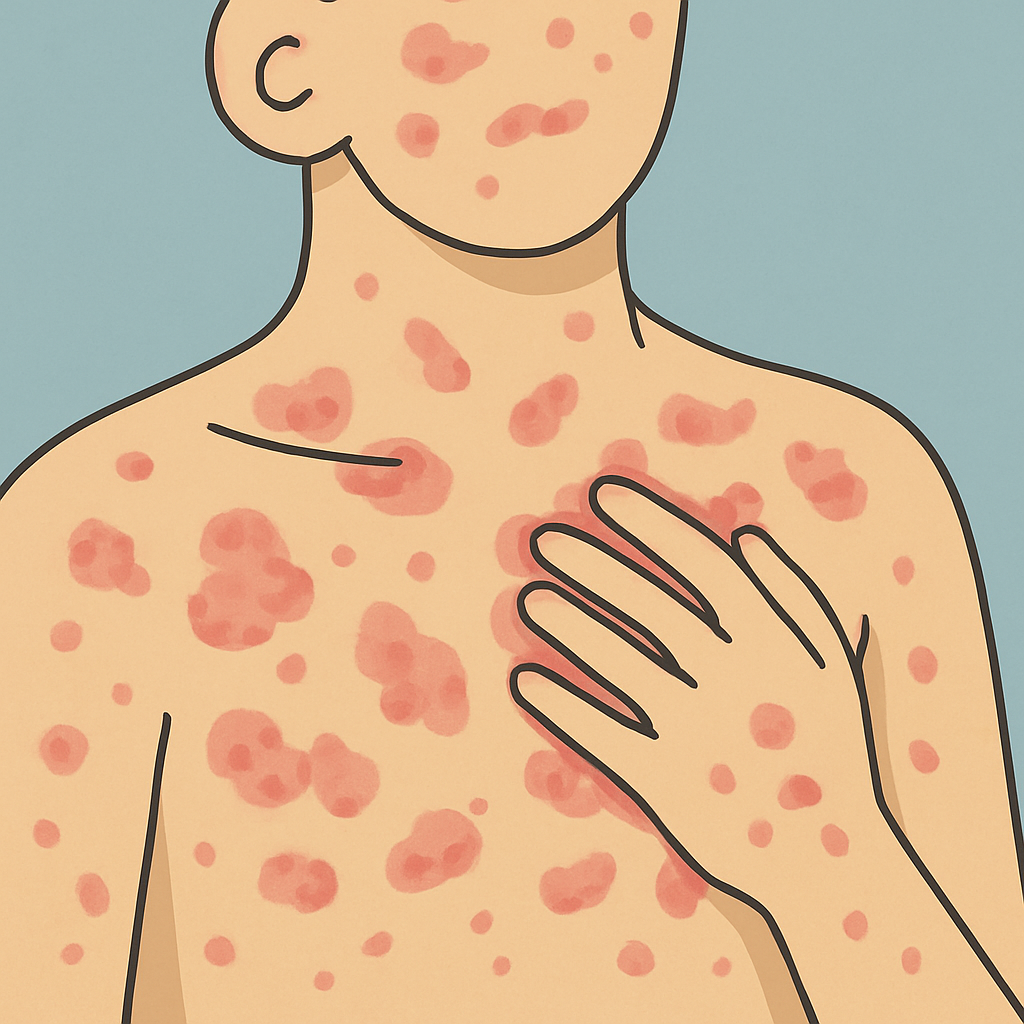Managing Allergic Urticaria: Causes and Treatment for Allergy-Induced Hives


have already shared their stories
Allergic urticaria, commonly known as allergy-induced hives, is a condition characterized by itchy, red welts on the skin. These hives are a result of an allergic reaction and can be triggered by various factors. This blog post will delve into the causes of allergic urticaria, including food allergy hives, and explore effective treatment options for managing this condition.
Understanding Allergic Urticaria
Allergic urticaria occurs when the body's immune system reacts to an allergen by releasing histamine and other chemicals into the bloodstream. This release causes the small blood vessels in the skin to leak, leading to swelling and the characteristic hives. These hives can vary in size and shape and often appear suddenly.
Causes of Allergic Urticaria
Identifying the causes of allergic urticaria is essential for effective management and prevention. Common causes include:
Food Allergies

Certain foods are known to trigger allergic reactions that may result in forming these hives. Common food allergens include:
- Peanuts and Tree Nuts: These are among the most common food allergens and can cause severe reactions.
- Shellfish and Fish: Seafood allergies can lead to hives and other allergic symptoms.
- Milk and Eggs: Dairy products and eggs are common allergens, especially in children.
- Wheat and Soy: These ingredients can trigger allergic reactions in sensitive individuals.
Medication Allergies
Certain medications can cause allergic urticaria. Common culprits include antibiotics (such as penicillin), nonsteroidal anti-inflammatory drugs (NSAIDs), and aspirin. If you suspect a medication is causing your hives, consult your healthcare provider for an alternative.

Environmental Allergens
Pollen, pet dander, dust mites, and insect stings are common environmental allergens that can trigger hives. Exposure to these allergens can cause the immune system to overreact, resulting in allergic urticaria.
Physical Triggers
In some cases, physical factors such as pressure, cold, heat, sunlight, or exercise can cause hives. This type of urticaria, known as physical urticaria, occurs when physical stimuli lead to the release of histamine in the skin.
Treatment for Allergy-Induced Hives
Effective treatment for allergic urticaria focuses on relieving symptoms and preventing future outbreaks. Here are some common treatment options:
Antihistamines
Antihistamines are the first line of treatment for allergic urticaria. They work by blocking the effects of histamine, thereby reducing itching, swelling, and redness. Non-drowsy antihistamines such as cetirizine (Zyrtec), loratadine (Claritin), and fexofenadine (Allegra) are commonly used for managing hives.

Corticosteroids
For severe cases of allergic urticaria, corticosteroids may be prescribed. These medications help reduce inflammation and suppress the immune system's response. However, they are typically used for short periods due to potential side effects.
Avoidance of Triggers
Identifying and avoiding known triggers is crucial for preventing allergic urticaria. Keeping a diary of foods, medications, and environmental exposures can help pinpoint specific allergens. Once identified, these triggers should be avoided.
Epinephrine
In cases of severe allergic reactions (anaphylaxis) that involve hives, epinephrine may be necessary. An epinephrine auto-injector (such as an EpiPen) can provide immediate relief by constricting blood vessels and opening airways. It is essential for individuals with severe allergies to carry an epinephrine auto-injector at all times.
Topical Treatments
Topical treatments such as calamine lotion, hydrocortisone cream, and cooling gels can provide relief from itching and discomfort. Applying these treatments to the affected areas can soothe the skin and reduce inflammation.
Immunotherapy
For individuals with severe or persistent allergic urticaria, immunotherapy (allergy shots) may be an option. This treatment involves gradually introducing small amounts of the allergen to desensitize the immune system over time. Immunotherapy can help reduce the frequency and severity of allergic reactions.
Conclusion
Managing allergic urticaria involves understanding the causes and implementing effective treatment strategies. Identifying triggers such as food allergens, medications, and environmental factors is crucial for preventing hives. Antihistamines, corticosteroids, and avoidance of known triggers are key components of treatment. For severe cases, epinephrine and immunotherapy may be necessary. By working closely with healthcare providers and adopting preventive measures, individuals with allergic urticaria can effectively manage their condition and improve their quality of life.

have already shared their stories
Sources
- Zuberbier, T., Aberer, W., Asero, R., et al. (2018). The EAACI/GA²LEN/EDF/WAO guideline for the definition, classification, diagnosis and management of urticaria. Allergy, 73(7), 1393-1414. https://doi.org/10.1111/all.13397
- Schaefer, P. (2017). Acute and Chronic Urticaria: Evaluation and Treatment. American Family Physician, 95(11), 717-724.
- Bernstein, J. A., Lang, D. M., Khan, D. A., et al. (2014). The diagnosis and management of acute and chronic urticaria: 2014 update. Journal of Allergy and Clinical Immunology, 133(5), 1270-1277. https://doi.org/10.1016/j.jaci.2014.02.036
- Kaplan, A. P. (2018). Diagnosis, pathogenesis, and treatment of chronic spontaneous urticaria. Allergy and Asthma Proceedings, 39(3), 184-190. https://doi.org/10.2500/aap.2018.39.4121
- Maurer, M., Rosén, K., Hsieh, H. J., et al. (2013). Omalizumab for the treatment of chronic idiopathic or spontaneous urticaria. New England Journal of Medicine, 368(10), 924-935. https://doi.org/10.1056/NEJMoa1215372








.avif)

